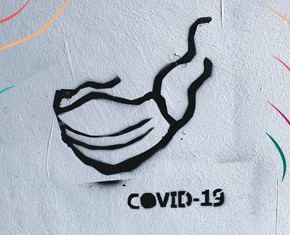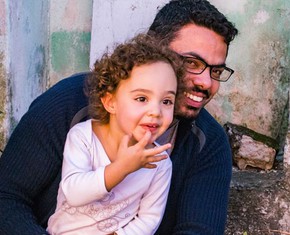The views expressed in our content reflect individual perspectives and do not represent the authoritative views of the Baha'i Faith.
Over the past few years, I’ve learned a lot about acceptance. Although I’m far from super chill now, practicing acceptance of God’s will has had a profound impact on my outlook, my mood, and my life.
In the past, as a very organized and strong-willed woman, I’ve felt most comfortable when I could control my surroundings. I used to think that controlling everything protected me, and that rigid control would make me a “good” Baha’i.
RELATED: Am I a Baha’i?
However, I’ve now come to realize that the illusory veil of rigid control is not what it means to be a Baha’i. Rather, rigid control comes from the arrogant assumption that any mere mortal can ever have power over nature and the universe.
During the past two years, I received two gifts that helped me recognize this illusion of power and control, and begin learning that detachment, humility, trust in God, and acceptance of God’s will were much more potent forms of protection and security than rigid control of my life. Both of those profound gifts – experiencing severe brain trauma and animating a junior youth spiritual empowerment group of seven 13-year-old boys – brought me to new realization and awareness.
Yes, severe brain trauma was quite the gift. I’ll explain.
Two years ago, I moved to West Philadelphia, Pennsylvania to serve for a year in a neighborhood that mostly consisted of families identifying as Black. I was eager to begin working alongside my community to learn about building unity through the Institute Process. Inspired by the Baha’i teachings, the Institute Process draws on the teachings of Baha’u’llah and his vision of the unified communities we can build and the types of spiritual people we can become. The Institute Process functions as a framework and tool for anyone who walks its path of service to direct their own intellectual and spiritual progress and contribute to the material and spiritual advancement of their community. It’s open to anyone of any background, of any faith or no faith.
But three days after moving into my new neighborhood, I stood up and hit my head on a granite countertop so forcefully that I caused severe brain trauma, or a concussion. Days of pain and dizziness turned into weeks, then months. My residual symptoms from the concussion lasted for more than a year.
This injury created a major spiritual test for me, a person who thought she needed to control everything.
Just having arrived in a new city, I wanted to jump right into facilitating a junior youth group, hosting Baha’i devotionals, and participating in intensive outreach campaigns. Instead, my brain trauma required that I sit in silence, alone, with only a little mental stimulation, limited to a mere 2-5 minutes at a time. I couldn’t do anything that I believed to be “productive.”
While recovering, without the ability to delve into the Baha’i writings or prayers, I decided to memorize a few of the writings of Baha’u’llah to comfort myself. Specifically, I worked on memorizing this passage from Baha’u’llah’s book The Hidden Words:
O Son of Spirit! Ask not of Me that which We desire not for thee, then be content with what We have ordained for thy sake, for this is that which profiteth thee, if therewith thou dost content thyself.
Although I had read this spiritual advice before, in my injured state, while unable to do anything I had planned or that I felt was “useful,” this quotation hit a little differently. To me, I felt as if God’s voice pointed out that in this moment, I couldn’t do anything to change my injury. Only by becoming content with my current state – by accepting what God had ordained – could I experience peace of mind and allow my brain to heal.
Another excerpt from a prayer by Baha’u’llah that I memorized says:
If it be Thy pleasure, make me to grow as a tender herb in the meadows of Thy grace, that the gentle winds of Thy will may stir me up and bend me into conformity with Thy pleasure, in such wise that my movement and my stillness may be wholly directed by Thee.
As I repeated this prayer to myself, I realized that accepting my body’s need to heal and be still was something “wholly directed” by God. Although I didn’t want to be injured or sit still, I needed to practice humility, detachment, and acceptance. If an injury required me to rest and recover, then that must be the right thing to do. Like a loving parent, I felt that God recognized my need to develop humility and trust in Him, placing me in a situation that would strengthen those qualities in my soul.
I do believe we have free will in how we respond to situations and challenges. But the writings of my Faith reminded me that I cannot control everything that happens to me. Rather, God controls the ocean of life, whether the waves roll tumultuously or lay in tranquil stillness. We can only control the direction our boat goes. With my concussion, I had to repeatedly accept that my period of “stillness” would allow my brain to heal – and to accept what it would take to make that happen.
When I recognized that the concussion could be a gift from God, our All-Loving Creator, I no longer saw the concussion as a punishment or a burden. Instead, I felt gratitude and love towards God. When I accepted my condition, I let go of guilt, frustration, and self-loathing, and I found myself feeling more peaceful, more calm, and more joyful. I had found freedom, not through control, but through accepting God’s will over my own.
With the blessing of being able to afford physical therapy, vision therapy, and having a compassionate, wise, and helpful concussion specialist, a little over a year later, I began serving in my neighborhood again, this time much more actively. When I recovered more or less fully from my concussion, I began supporting a weekly junior youth group composed entirely of 13-year-old boys. Through this service, I experienced another opportunity to practice acceptance. While various negative forces assailed this neighborhood, the community itself displayed resilience, deep love for God, and a strong desire for collaboration.
However, when my junior youth group met, challenges of very disruptive and harmful behavior derailed my plans for each group meeting. The team I served alongside in the neighborhood regularly comforted me when I cried after each meeting: “What am I doing wrong?!”
As I sat in silence reflecting on the junior youth group, I often blamed myself for something I didn’t do or for losing my temper at the young men. However, as I continued to turn to the Baha’i teachings for solace and support, I once again realized I was holding on too tightly to the veil of total control.
RELATED: Mentorship: A Key to Building a Better World
Baha’u’llah wrote: “Set all thy hope in God, and cleave tenaciously to His unfailing mercy. Who else but Him can enrich the destitute, and deliver the fallen from his abasement?” Although I do need to plan, study, and learn, I realized that planning and mentally shaming myself wouldn’t solve all my weekly feelings of utter despair and dread. Rather, I learned that my attitude and expectations that “all would be changed” each week represented a mindset that brought me pain. I had to accept that just because I showed up and was trying doesn’t mean the boys would automatically “be changed.” Such an expectation proved faulty, egotistical, patronizing, and not the true nature of the institute process, which revolves around the idea that all are protagonists for change – that each person has control of their own spiritual growth.
I felt shaken to my core when I realized “who else but God can change anyone?” I may act as God’s channel, but at the end of the day, the power and source of change and goodness is God.
After I began reading that quotation regularly, I began responding in less aggrieved ways when the junior youth group meetings didn’t go as planned. I accepted that all I could do was make efforts, and any spiritual growth that may occur would only happen with God’s will and not mine.
I’m still working on accepting the difficult things in my life and the moments I don’t like, but I’ve come a long way. Of course, my acceptance of God’s will would never have happened without God Himself willing that I progressed. I’ve learned that unforeseen and unwanted events in our lives, or things that don’t go our way, aren’t punishments or things to “get over.” Rather, these experiences are often ordained by God – they’re spiritual gifts, opportunities for us to graciously and gratefully accept and learn so our souls can grow.
















Comments
Sign in or create an account
Continue with Googleor